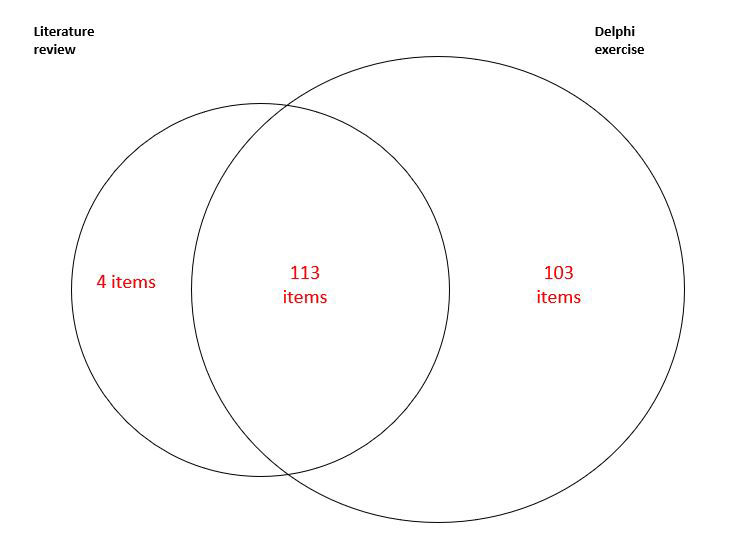Session Information
Date: Monday, November 14, 2022
Title: SLE – Diagnosis, Manifestations, and Outcomes Poster III: Outcomes
Session Type: Poster Session D
Session Time: 1:00PM-3:00PM
Background/Purpose: The SLICC, ACR and LFA embarked on a data- and expert-driven project to develop a revised systemic lupus erythematosus (SLE) organ damage index (SDI). The methodological approach includes 5 phases: updating the construct of damage (I), item generation (II), item reduction (III), item weighting and threshold determination (IV), and the assessment of validation and reliability (V). In phase I, a consensus statement was developed to define the construct of damage in SLE1. In the Item Generation phase, we aimed to develop and agree on a candidate list of items that reflect the construct of damage in SLE and are appropriate to be included in a new damage index including consideration of relevant items from adult, paediatric and young adult SLE. In this analysis, we compare the two approaches to initial item generation that were employed in a parallel process, namely a literature review and a Delphi exercise.
Methods: Item generation included a literature review and 3-part Delphi exercise. A group of lupus experts conducted a literature review to identify items that reflect the construct of damage in SLE and grouped the items into organ domains. Each domain was reviewed by paediatric rheumatologists.
Snow-ball sampling was used among SLICC members, asking them to nominate 3-4 SLE experts considering a range of clinical expertise, equality, diversity and inclusiveness factors, and the global nature of SLE research. The LFA, Lupus UK, Lupus Europe and Lupus Canada were also asked to nominate 4-6 patient/carer representatives to participate in the Delphi exercise. Participants were asked to nominate items that should be included in a revised damage index based on the updated construct definition1 using a free-text option in Delphi exercise.
Results: We established a group of 146 individuals (mean age 50.6 ranging from 28 to 79 years; 60.3% females; 58.9% white; clinical experience from 1 to 51 years) from 35 countries, broadly representative of the lupus research and patient community. There were 135 medical doctors, 2 allied health professionals and 9 patients. Of 135 medical doctors, 120 were rheumatologists, 7 internists, 5 nephrologists, 2 dermatologists, and 1 immunologist. The response rate after the first round Delphi exercise was 97.9%.
All items in the original SDI were nominated in both processes. Item generation yielded approximately 2,600 items. After rationalising for repetition, redundancy, and harmonisation of synonyms, 220 unique items were identified across 14 organ systems. The literature review proposed 4 (1.8%) unique items, 103 (46.8%) unique items were from the Delphi only and 113 (51.4%) items appeared in both exercises (Figure 1).
Conclusion: Using a combined data-driven and expert/patient-based approach, items and domains that comprise damage in SLE have been expanded. Just over half of all items were nominated by both approaches. However the Delphi exercise, that included a wide and diverse group of contributors, provided a large number of unique items for further consideration. Our data confirms the value of large group exercises early in such a process to maximise the scope of new items to consider for a revised index.
1) Johnson, S. R et al. (2021). Evaluating the construct of damage in SLE. Arthritis Care Res
To cite this abstract in AMA style:
Kundakci B, Barber M, Clarke A, Johnson S, Brunner H, Cho J, Costedoat-Chalumeau N, Ginzler E, Hanly J, Hasan A, İnanç M, Kabani N, Legge A, Lima K, Lindoso L, Mak A, Ramsey-Goldman R, Ruiz-Irastorza G, Silva C, Tamirou F, Trindade V, Vinet E, Bruce I. The Systemic Lupus Erythematosus International Collaborating Clinics (SLICC), American College of Rheumatology (ACR), and Lupus Foundation of America (LFA) Damage Index Revision – Item Generation Phase [abstract]. Arthritis Rheumatol. 2022; 74 (suppl 9). https://acrabstracts.org/abstract/the-systemic-lupus-erythematosus-international-collaborating-clinics-slicc-american-college-of-rheumatology-acr-and-lupus-foundation-of-america-lfa-damage-index-revision-item-generation-phas/. Accessed .« Back to ACR Convergence 2022
ACR Meeting Abstracts - https://acrabstracts.org/abstract/the-systemic-lupus-erythematosus-international-collaborating-clinics-slicc-american-college-of-rheumatology-acr-and-lupus-foundation-of-america-lfa-damage-index-revision-item-generation-phas/

